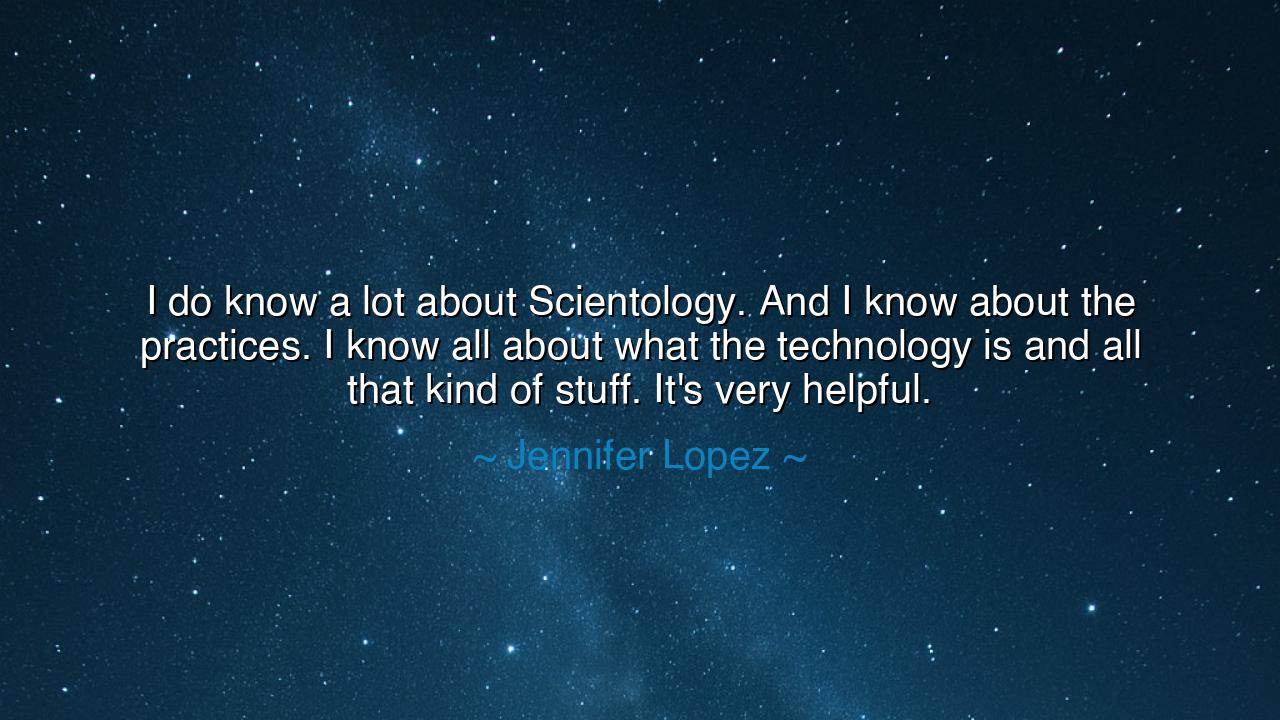
I do know a lot about Scientology. And I know about the
I do know a lot about Scientology. And I know about the practices. I know all about what the technology is and all that kind of stuff. It's very helpful.






Hear the words of Jennifer Lopez, who spoke with candor about her encounters with a path that has stirred both fascination and controversy: “I do know a lot about Scientology. And I know about the practices. I know all about what the technology is and all that kind of stuff. It’s very helpful.” Though spoken in the language of the modern world, these words touch on an ancient truth—that every age brings forth systems of belief and discipline, each offering its own vision of healing, order, and transformation.
She speaks first of knowledge, declaring, “I do know a lot.” This is not the voice of one passing by in ignorance, but of one who has looked within the walls of a practice, studied its rituals and methods, and judged their worth. To know about the practices is to grasp not only their form but their purpose, for every spiritual or philosophical tradition, whether ancient or modern, presents a way to shape the inner life through outward discipline. And Lopez affirms that in her experience, these practices proved “helpful.” In this, she reminds us that wisdom is not always found in dogma, but in the lived experience of what strengthens the spirit.
She mentions the technology of Scientology—a term unusual to the ears of tradition, yet rooted in the same desire as the practices of old. In ancient times, seekers spoke of “methods” or “disciplines”; in modern speech, it becomes “technology.” But the essence is unchanged: tools created to aid the seeker in confronting weakness, overcoming chaos, and moving toward clarity. Whether it is a monk’s meditation, a philosopher’s dialectic, or a modern system’s structured exercises, the purpose remains the same—to awaken the individual to their own inner strength.
History provides us with a mirror in the story of the Stoics. Marcus Aurelius, Epictetus, and Seneca all taught not by temples and sacrifices, but by practices: journaling, self-examination, and the daily correction of one’s thoughts. To the outside world, these might have seemed like mere exercises—cold routines. Yet for those who practiced them, they became a kind of spiritual technology, helping them endure hardship, loss, and uncertainty with courage. So too does Lopez suggest that modern practices, however named, may bring help when sincerely applied.
Yet in her words lies also a subtle warning. For she names what is helpful, not what is ultimate. She does not speak of eternal truth or final answers, but of practices that aid the individual on the journey. This is a wisdom worth remembering: that systems, however structured, are but tools. The danger lies not in using them, but in mistaking them for the whole of truth. Just as a ship is meant to cross the sea and not to be worshiped, so too are practices meant to serve the traveler, not to become the object of their devotion.
The lesson is clear: be open to the practices and technologies of your age, but weigh them with discernment. Seek what is helpful, but do not surrender your judgment. Learn from traditions, old and new, but remember that the power of transformation lies not in the practice itself, but in the sincerity with which it is lived. As Lopez suggests, help may be found in unexpected places, but wisdom demands that we use such help as a stepping stone, not as a chain.
Practical actions follow. Explore the teachings that come your way, whether through books, mentors, or traditions. Test their practices honestly in your life, and keep what strengthens your heart while discarding what binds it. Remain humble enough to learn, yet courageous enough to question. And above all, remember: the greatest technology of all is the human spirit itself, with its capacity for resilience, love, and growth.
Thus, Jennifer Lopez’s words remind us that systems may vary, languages may change, but the human need for guidance endures. And in every age, those who seek with discernment will find what is helpful, shaping their path not through blind loyalty, but through wisdom that knows how to use tools without being mastered by them.






AAdministratorAdministrator
Welcome, honored guests. Please leave a comment, we will respond soon